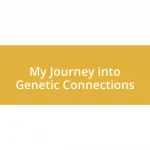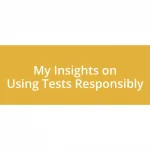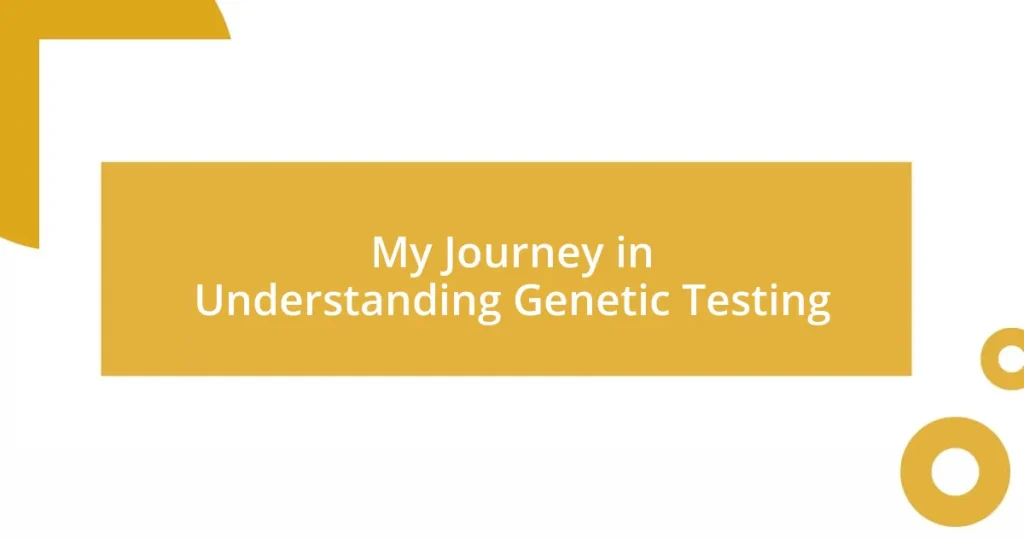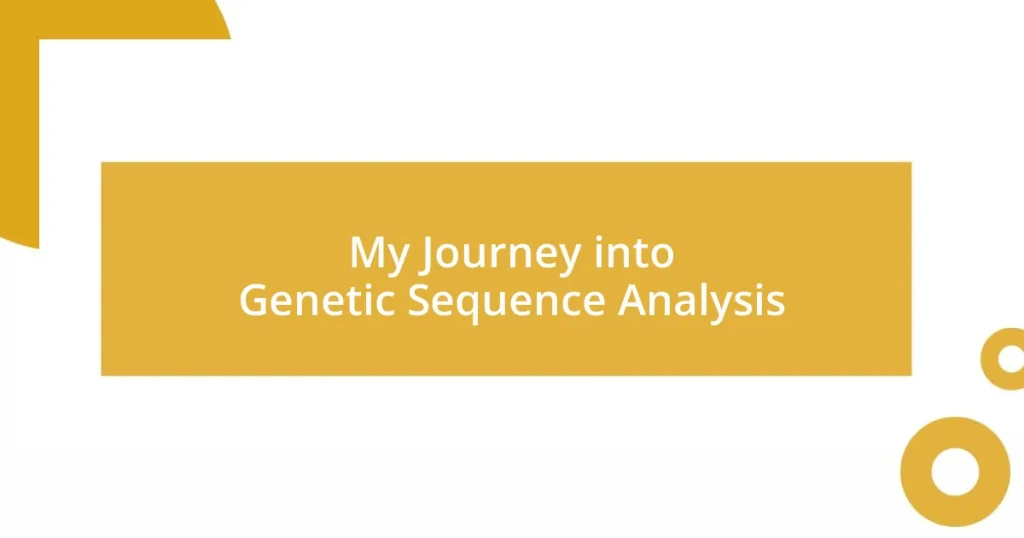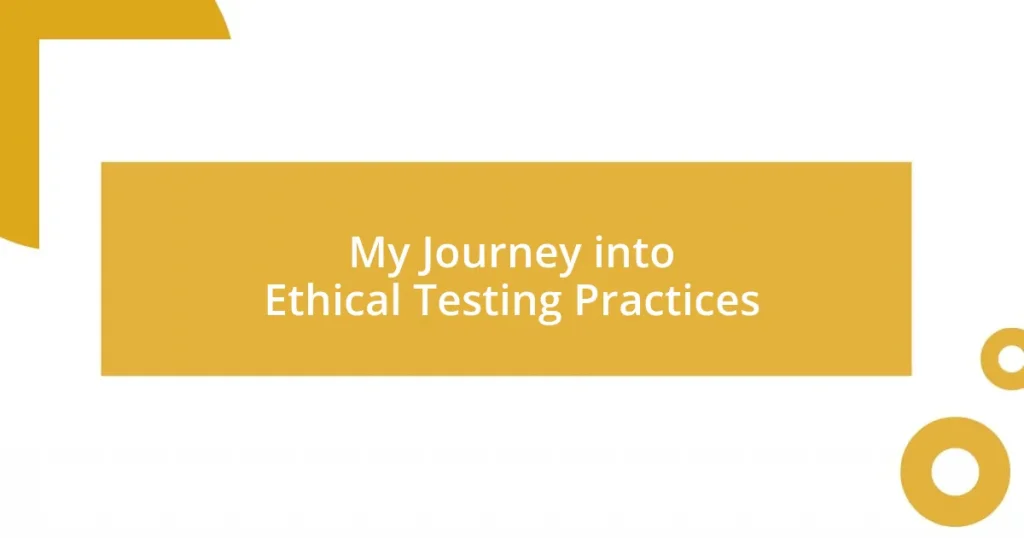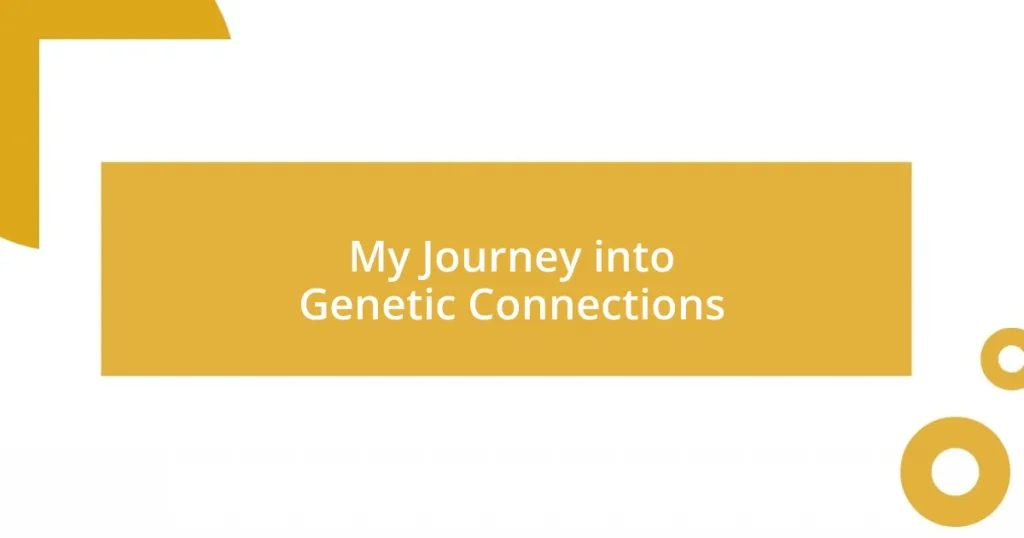Key takeaways:
- Genetic testing empowers individuals by revealing health risks and enabling proactive health management through informed decisions.
- Different types of genetic tests (diagnostic, carrier, predictive & preventive) serve distinct purposes, helping individuals understand their genetic background and make family planning choices.
- Choosing a reputable genetic testing service is essential; factors like accreditation, expert guidance, and privacy policies impact the quality of information received.
- Sharing genetic test results with family fosters open dialogue, helping to navigate emotional responses and strengthen family bonds during uncertain times.
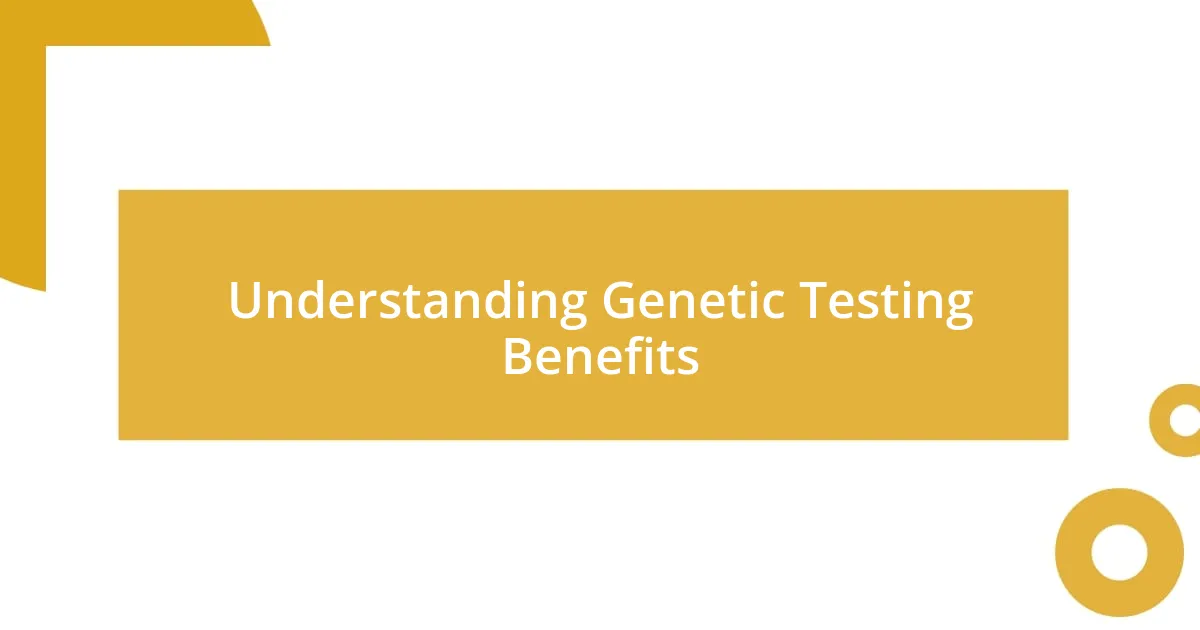
Understanding Genetic Testing Benefits
Genetic testing offers a profound opportunity to uncover valuable information about our health and ancestry. I remember feeling a wave of excitement when I first received my test results; it felt like holding a key to a family mystery. Can you imagine knowing your risk for certain conditions and taking proactive steps to manage your health?
Beyond the thrill of discovery, understanding genetic testing benefits can significantly impact our lives. For instance, when a friend learned about her predisposition to breast cancer through testing, she embraced regular screenings and lifestyle changes. Isn’t it empowering to think that knowledge can lead to prevention and early intervention?
Moreover, genetic testing can enhance our understanding of inherited traits, helping people make informed family planning decisions. Reflecting on my own family’s health history, I often ponder how different choices might have been made had we had access to this information earlier. Isn’t it fascinating how knowing just a bit more about our genetic makeup could alter the course of our lives?
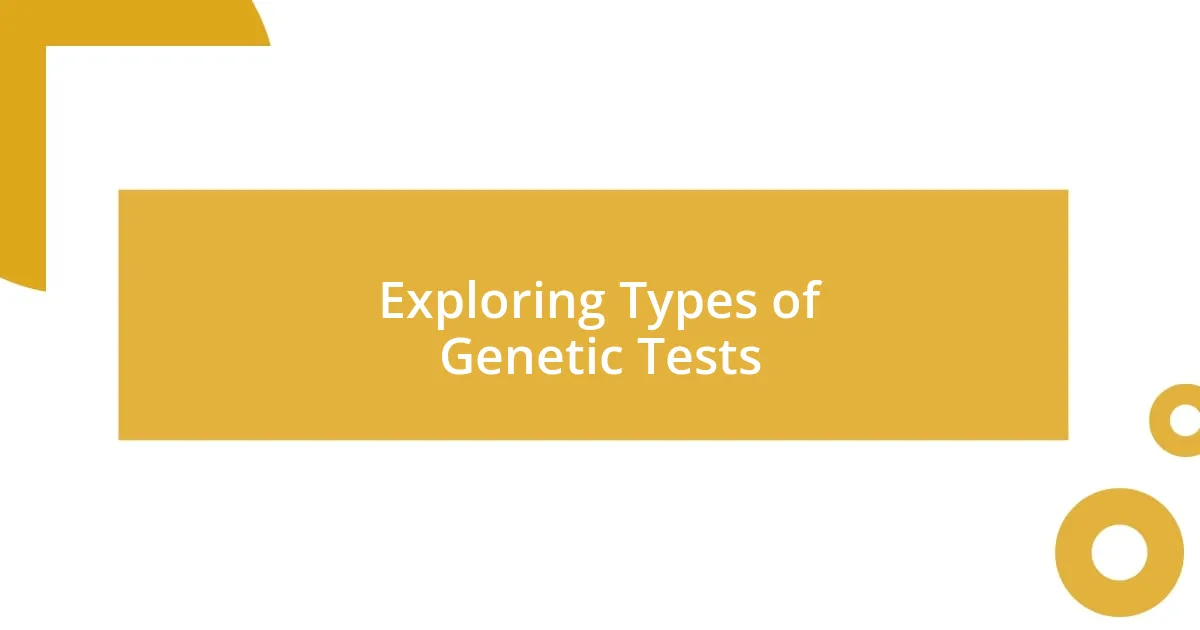
Exploring Types of Genetic Tests
Understanding the various types of genetic tests can truly deepen our appreciation for what they offer. One type, the diagnostic test, is crucial for confirming or ruling out genetic disorders, often providing clarity in uncertain medical situations. I’ll never forget when my brother underwent such testing; the relief we felt when the results finally explained his symptoms was overwhelming.
On the other hand, carrier testing serves a different purpose. It reveals whether an individual carries a gene for inherited disorders, even if they don’t show symptoms themselves. In my own journey, discovering that I am a carrier for a specific condition opened up conversations about family planning with my partner. It was a deeply personal moment that highlighted the importance of understanding our genetic backgrounds.
Lastly, there are predictive and preventive tests, which assess the likelihood of developing certain conditions based on genetic predisposition. I experienced a mix of anxiety and hope when I received my results for this type of test. It wasn’t just about what I might face; it was about seizing control over my health journey moving forward. Each test type offers unique insights, shaping our understanding of our genetics in meaningful ways.
| Type of Genetic Test | Description |
|---|---|
| Diagnostic Testing | Confirms or rules out genetic disorders based on symptoms. |
| Carrier Testing | Identifies carriers of gene mutations for inherited conditions. |
| Predictive & Preventive Testing | Assesses risk for developing certain conditions based on genetics. |
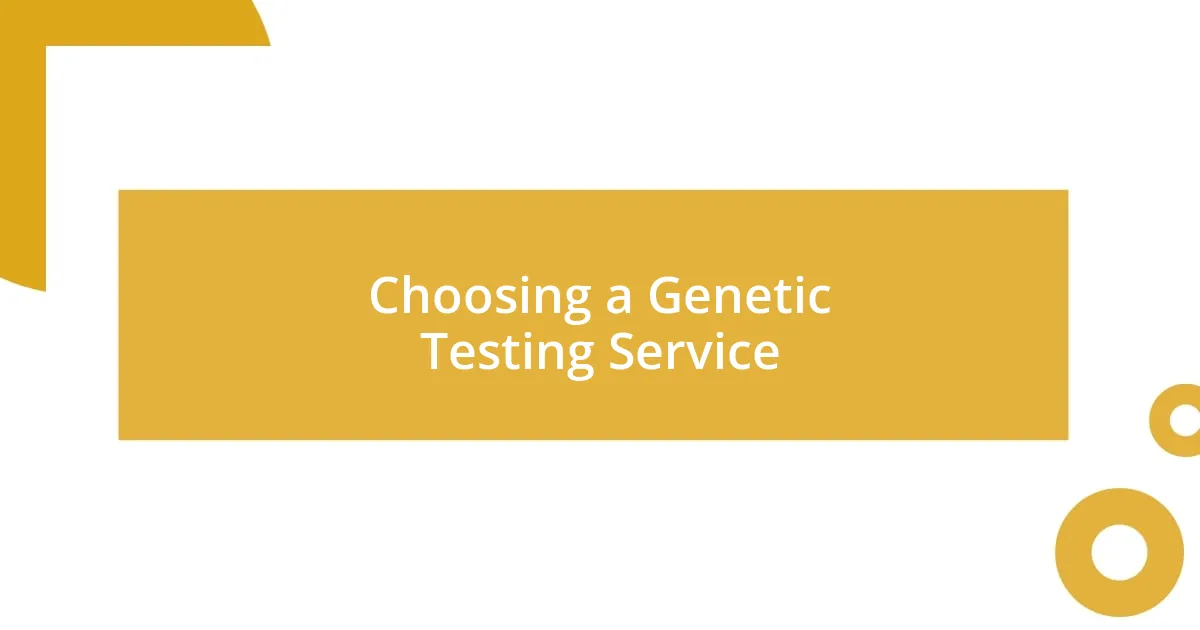
Choosing a Genetic Testing Service
Choosing the right genetic testing service is crucial, as it can greatly influence the quality of the information you receive. I recall the moment I began my search; I felt both overwhelmed and excited by the plethora of options available. After conducting thorough research, I realized how essential it was to consider factors like accreditation, the expertise of their laboratory, and customer reviews. It’s almost like picking a trusted guide for an important journey—who you choose can make a world of difference.
When evaluating potential services, you might want to keep these key points in mind:
- Accreditation: Ensure the lab is certified by relevant bodies, like the Clinical Laboratory Improvement Amendments (CLIA).
- Expertise: Look for companies with genetic counselors available to interpret results and offer guidance.
- Privacy policies: Make sure they have clear, robust measures in place to protect your genetic information.
- Testing scope: Understand what kind of tests they specialize in and whether it aligns with your needs.
- Customer support: Assess their availability for questions, especially when deciphering results.
Taking these considerations into account can help you feel confident about the decision you make, and gives you a sense of assurance that your journey into genetic testing is being guided by a reputable service.
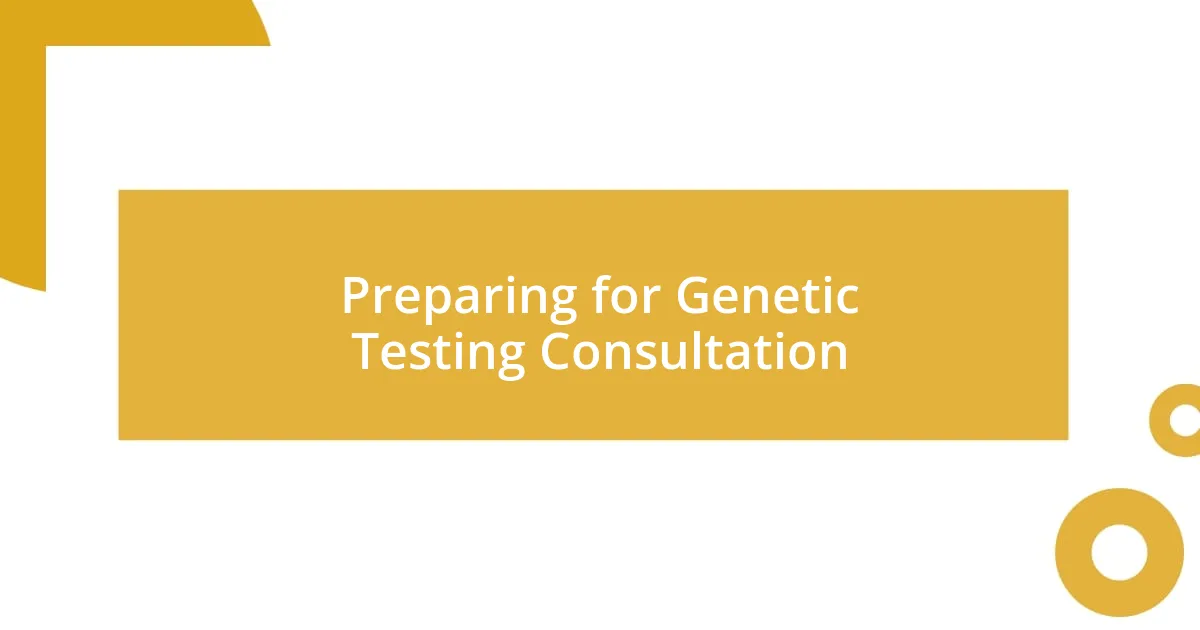
Preparing for Genetic Testing Consultation
Preparing for a genetic testing consultation can feel like a whirlwind of emotions. I remember going through my own preparation; I wasn’t just nervous—I was also curious about what the results could mean for my life. One of the best things I did was jot down questions beforehand, capturing all the thoughts swirling in my mind. Have you ever thought about what you’d like to ask? It really helps to think it through before the consultation.
Another important step is gathering your family’s medical history. Reflecting on my own family’s health background was eye-opening; I realized how interconnected our genetic information is. It made me appreciate the broader context of my genetic makeup and the potential implications for my health. So, while preparing, taking some time to understand your family’s health patterns can give you critical insights to discuss with your healthcare provider.
Lastly, consider your emotional readiness for the outcomes. I had conversations with trusted friends about my fears and hopes, which honestly made a difference. Understanding that genetic testing is as much about emotional preparation as it is about scientific inquiry can truly enrich your experience. What do you think about that? Embracing both the science and the emotional aspects can pave the way for a more helpful consultation.
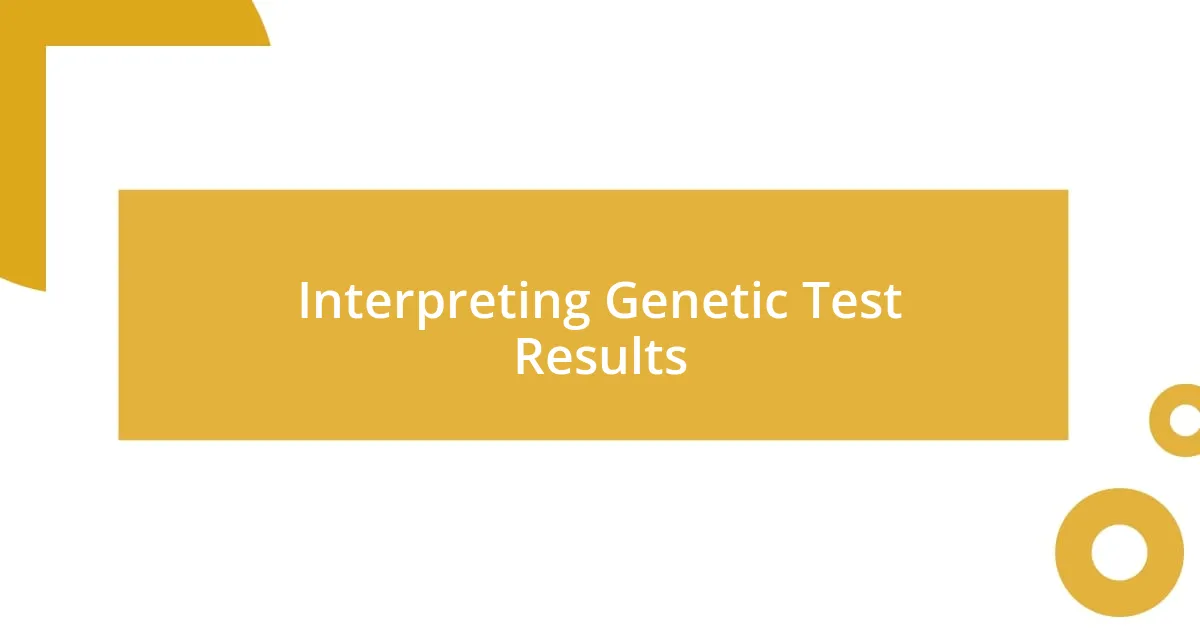
Interpreting Genetic Test Results
Interpreting genetic test results can feel daunting. I remember sitting with my report in hand, staring at the series of letters and numbers that seemed like a puzzle waiting to be solved. Initially, I was overwhelmed, trying to decipher the significance of variants and what they meant for my health. Have you ever found yourself lost in medical jargon? A good genetic counselor can really bridge that gap, offering insights that can turn those intimidating results into a manageable story.
One of the most crucial aspects of interpreting the results lies in understanding the difference between “benign,” “likely benign,” and “pathogenic” variants. When I first came across these terms, I was confused about how they would affect my health. It’s essential to grasp that not all genetic variants lead to disease; some are simply part of what makes us unique. Context is key—knowing how a specific variant interacts with your medical history can guide you toward informed decisions. This was a light bulb moment for me; my genetic makeup doesn’t just define my risks; it also connects to my lifestyle choices.
Moreover, I learned that interpreting results is not a one-time event but an ongoing process. As scientific knowledge evolves and new research emerges, the implications of my test results can also change. I found myself revisiting my results months later, equipped with a deeper understanding of what they meant in light of new information. This experience reinforced the idea that staying informed and engaged with my health, and continuously seeking advice from professionals, is vital. Isn’t it empowering to think that we can be active participants in our health journeys?
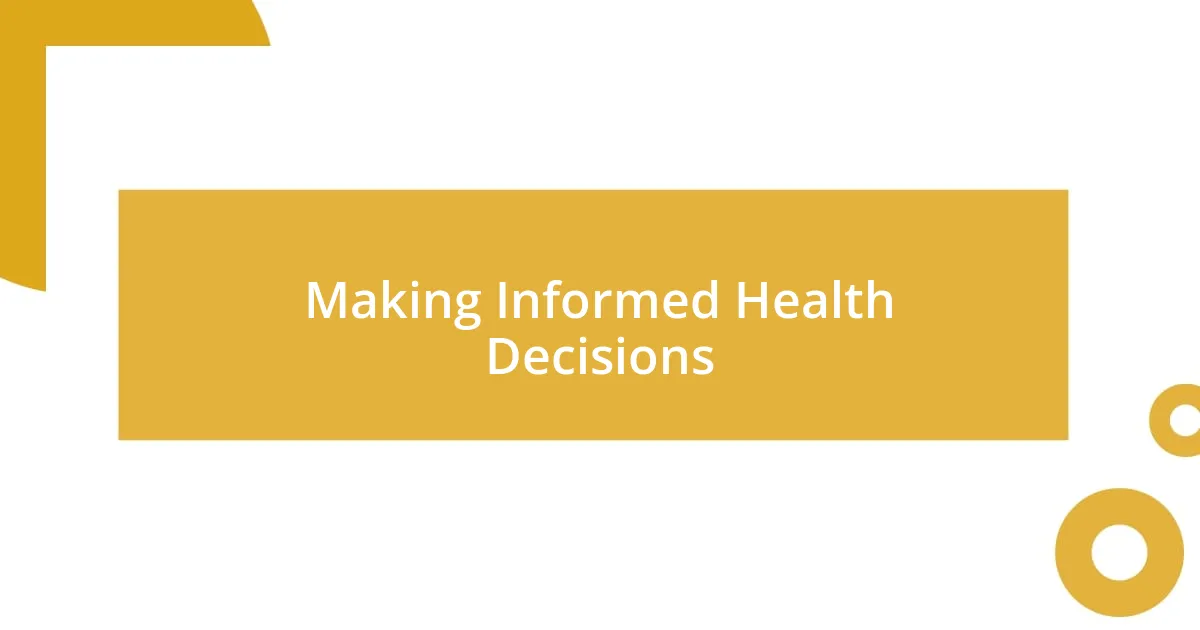
Making Informed Health Decisions
Making informed health decisions is crucial when navigating the world of genetic testing. I vividly recall the day I first received my results; my heart raced as my doctor walked me through the implications of my findings. The power of knowledge really hit me then—understanding my genetic risks wasn’t just about anxiety; it was about taking control. Have you ever experienced that moment when you realize you hold the key to your health?
As I continued exploring my options, I found that open communication with my healthcare team made all the difference. I remember asking my doctor about preventive measures and lifestyle changes I could adopt. These conversations sparked a realization; informed decisions aren’t solely about what tests say, but also about the dialogue you maintain with those guiding you. How often do you openly discuss your health concerns with professionals?
Ultimately, making informed health decisions allowed me to shift from a reactive mindset to a proactive one. For instance, I chose to incorporate regular screenings and genetic counseling into my routine after understanding my risks. Every small action I took felt like I was equipping myself with a safety net. Isn’t it comforting to know that by being informed, we can make choices that could significantly enhance our quality of life?
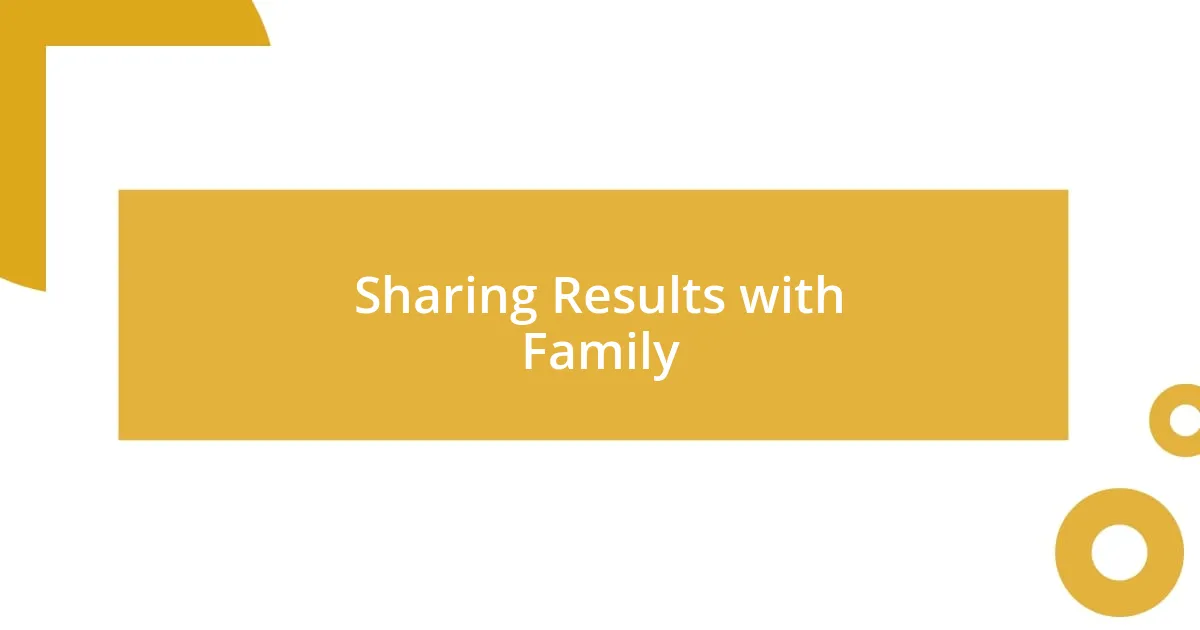
Sharing Results with Family
Sharing genetic test results with family can be a mix of relief and apprehension. I vividly recall the evening I gathered my loved ones to discuss my findings. It felt like walking a tightrope, balancing the desire to inform them with the fear of causing unnecessary worry. Have you ever held something important inside, dreading how others might react?
What struck me was how each family member responded differently. While some were supportive and ready to engage in discussions about what it all meant, others seemed overwhelmed or unsure about how to process the information. This experience highlighted that sharing results is not just about the facts; it’s about the emotional context and the dynamics of family relationships. How do you navigate those complicated feelings when it comes to your health?
In hindsight, I think it was the open dialogue that truly mattered. I encouraged questions, patiently walked them through what I understood, and acknowledged their concerns. This approach fostered a sense of togetherness, reassuring them that we were in this journey of understanding as a unit. It reaffirmed that even the toughest conversations can bring families closer—after all, who better to support each other than the ones we love?


